Shared hosting emerges as a popular choice for individuals and small businesses—with its affordable plans, scalability options, and beginner-friendly features, shared hosting offers a versatile solution.
Let’s explore some of the best shared hosting plans.
It is recommended for beginners who may not have the technical knowledge to manage their server.
Some of the best-shared hosting providers include
- Bluehost,
- Hostinger,
- SiteGround,
- HostGator,
- DreamHost,
- InMotion,
- and Chemicloud.
Table of Contents
ToggleWhat is Shared Hosting?
Shared hosting is a type of web hosting where multiple websites are hosted on a single server, sharing resources such as disk space, bandwidth, and computing power.
This makes shared hosting an affordable option, as server maintenance and resource costs are distributed among the various websites hosted on the server.
Best Shared Hosting 2024 (Comparison Table)
With so many available options, choosing the best one for your needs can be overwhelming.
Let’s delve into various aspects of shared hosting and first see their comparison table based on their features.
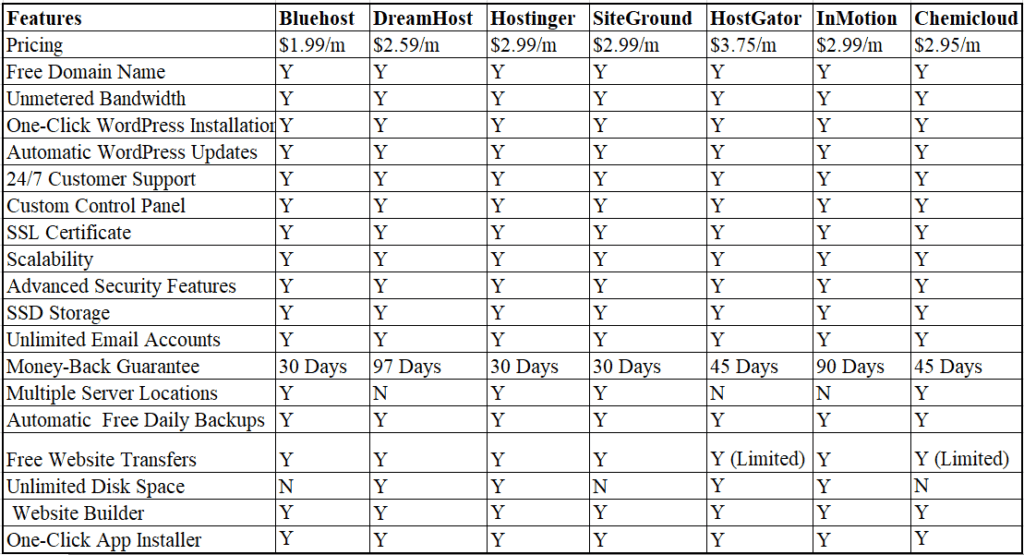
Let’s know all the terms mention above for more clarity.
1. Domain Name:
A domain name is the address of a website on the internet.
A unique string of characters represents a specific location on the web.
Domain names are used to quickly identify and access websites without remembering the complex numerical IP addresses associated with web servers.
For example, in the domain name “www.example.com,” “example.com” is the domain name.
2. Unmetered bandwidth
It is a type of internet data transfer in which the amount of data that can be transferred over a certain period is unlimited.
This means you can transfer as much data as you need without worrying about additional fees or slowing down your website because you have exceeded a data transfer limit.
3. One-click WordPress installation
This is a feature many web hosting providers offer.
It allows users to easily and quickly install the WordPress content management system (CMS) on their website without manual setup.
4. Automatic WordPress updates
It refers to the feature that allows the WordPress content management system (CMS) to update itself automatically to the latest version without requiring manual intervention from the website owner or administrator.
5. 24/7 customer support
Refers to customer service available around the clock, 24 hours a day, 7 days a week.
This means that customers can reach out for help, support, or assistance at any time, regardless of the time of day or geographic location.
6. A custom control panel
It is a web-based interface provided by a web hosting provider that allows users to manage various aspects of their hosting account and website in a personalized and customizable way.
7. An SSL (Secure Sockets Layer) certificate
It is a digital certificate that encrypts data exchanged between a user’s web browser and a web server.
It provides a secure and encrypted connection, ensuring that information transmitted over the internet remains private and cannot be intercepted or tampered with by unauthorized parties.
8. Scalability
In the context of a hosting provider, it refers to the ability to adjust and accommodate increased demand or traffic on a website or application.
It involves the hosting provider’s capability to handle and support the growth of a website’s resources, performance, and user base as needed.
9. Solid State Drive (SSD)
It is a storage device that uses flash memory to store data.
SSDs are entirely electronic and have no moving parts, making them faster, quieter, and more reliable than traditional hard drives.
Because of their lack of moving parts, SSDs tend to be more durable and less prone to mechanical failures.
10. A money-back guarantee
It is a promise made to customers that if they are not satisfied with the service provided by the web host, they can request a full refund of their money within a specified period.
Most web hosting providers offer a 30-—to 90-day money-back guarantee. Some providers offer longer periods.
11. Multiple Server Locations
When a web hosting provider offers multiple server locations, they have data centers or server facilities in different geographical regions worldwide.
Having servers in multiple locations allows the hosting provider to offer their customers better performance, reliability, and flexibility.
12. Automatic free daily backups
This is provided by a hosting provider refer to backing up all the data and files associated with your website or hosting account daily, at no additional cost to the customer.
This service ensures that in the event of data loss, website malfunction, or accidental data deletion, the customer can restore their website to a previous state using the backups.
13. Free website transfer
It is a service offered by some web hosting providers that lets you move your website from your current hosting provider to another hosting company at no additional cost.
This service benefits those looking to switch to a new hosting provider or upgrade to a better hosting plan.
14. Unlimited disk space
When a hosting provider advertises “unlimited disk space,” no specific limit is placed on the amount of disk storage space you can use for your website or hosting account.
This feature allows you to store and manage extensive data, files, and content without worrying about running out of storage capacity.
15. Website builder
It is a tool that allows individuals and businesses to create and design their websites without needing deep technical knowledge or coding skills.
Website builders typically provide a user-friendly interface and a selection of templates, design elements, and customization options, enabling users to construct and customize a website to their specific needs and preferences.
16. One-Click App Installer
Web hosting refers to a tool or feature provided by hosting providers that simplifies installing applications onto a website.
Instead of manually going through the installation steps, a One-Click App Installer streamlines the process by automating tasks such as setting up databases, configuring files, and downloading the software with a single click.
I hope you understand. If you have any questions, please write to us in the comment section. We would love to answer all your queries related to blogging.
Let’s move further and know the advantages and disadvantages of shared hosting.
Benefits of Shared Hosting
Let’s delve into the benefits and considerations of shared hosting, considering diverse perspectives to help you make an informed decision.
- Cost-effective: Shared hosting is an affordable option compared to other types of web hosting, as the costs are shared among multiple users utilizing the same server resources.
- Easy to use: Shared hosting is user-friendly, making it an excellent option for beginners starting their website journey.
- Low maintenance: The hosting provider typically handles server maintenance and updates, freeing you from the technical aspects of hosting management.
- Scalable: Shared hosting plans can be upgraded easily as your website grows, allowing you to access more resources such as disk space, bandwidth, and email accounts.
- Multiple features: Shared hosting plans include many features, such as a cPanel control panel, email management, website builders, and one-click app installs like WordPress, Joomla, and Drupal.
- 24/7 Customer Support: Hosting providers offer around-the-clock customer support to ensure you have help whenever needed.
- Reliable: Shared hosting servers are monitored and maintained consistently, providing high uptime rates and reliable performance.
- Improved security: Hosting providers implement security measures like firewalls, malware scanning, and regular updates to protect shared servers from security threats.
These benefits make shared hosting an excellent option for hosting small to medium-sized websites and blogs.
What are the Advantages and Disadvantages of Shared Hosting Plans?
Let’s understand the advantages and disadvantages of shared hosting plans before deciding.
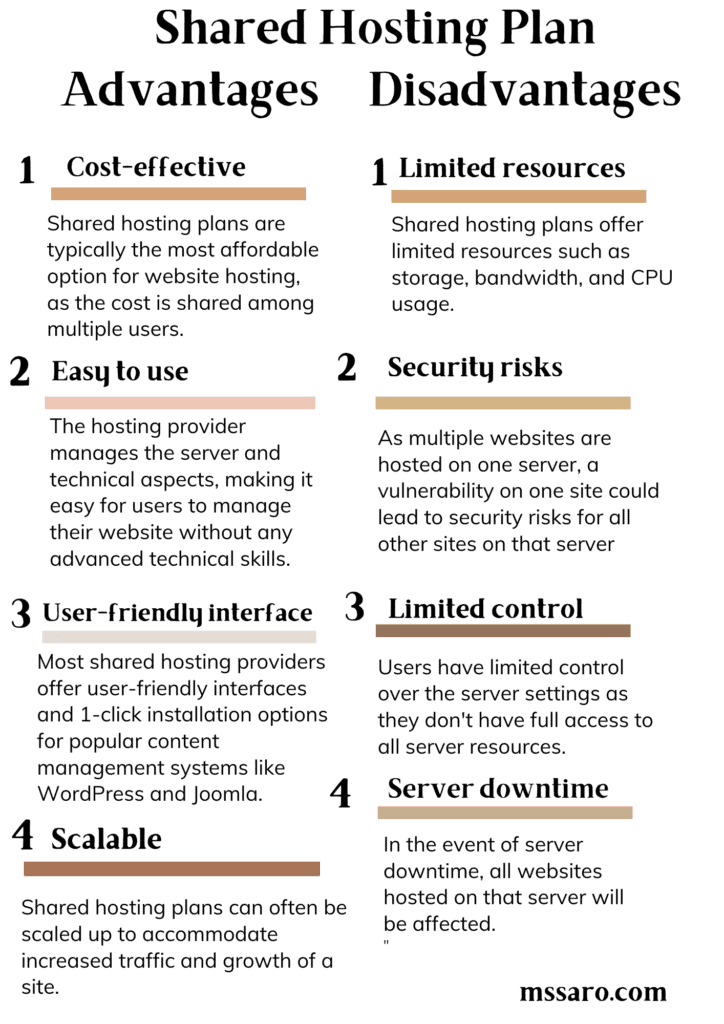
How to Pick the Best Shared Hosting Plan for Your Needs
Web hosting is the backbone of every website. Finding the perfect hosting plan can be daunting if you’re planning to build a website for your business or personal blog.
Choosing a shared hosting plan can be a good option for beginners and small businesses that want to keep their costs low while getting reliable performance.
With so many options available in the market, crucial factors should be considered before signing up for a shared hosting plan.
Infographics on How to pick the Best-Shared Hosting Plan
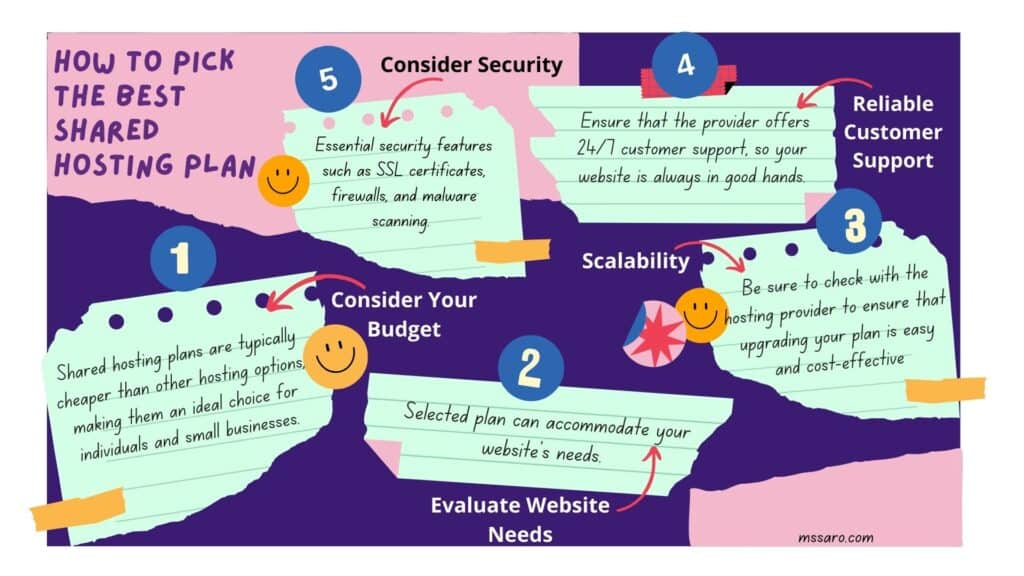
We know about shared hosting, but what about the best-shared plans? Let’s see and analyze one by one.
Best Shared Hosting Plans in 2024
Bluehost
Founded in 2003, Bluehost is a trusted web hosting provider catering to millions of websites worldwide.
Acquired by Endurance International Group, Bluehost offers a wide range of hosting solutions, including shared hosting, WordPress hosting, VPS hosting, dedicated servers, and more, making it a versatile choice for websites of all sizes and types.
With over 2 million websites hosted worldwide, Bluehost has established itself as a leading web hosting provider.
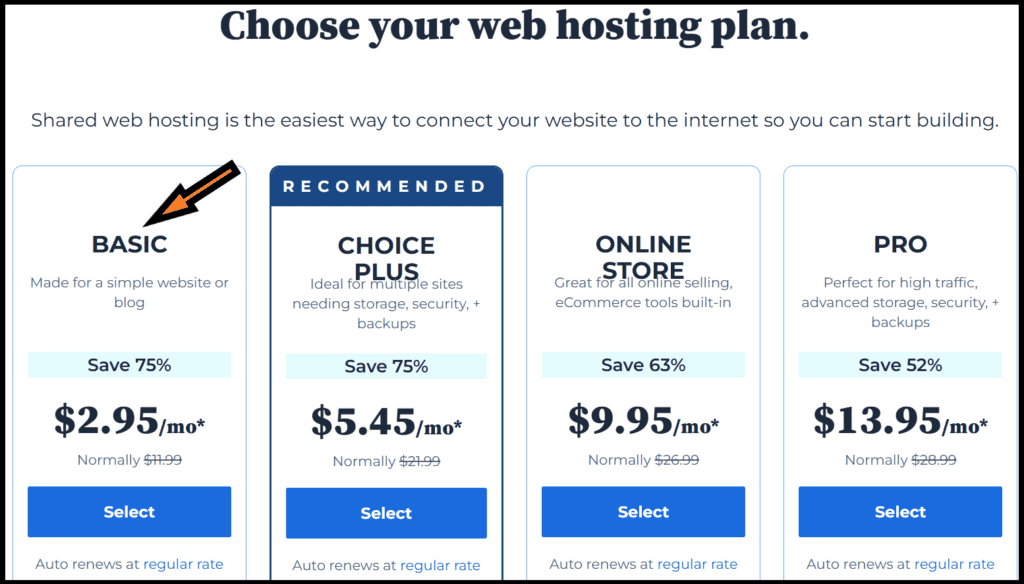
The Pros and Cons of Bluehost’s Shared Hosting
Let’s explore the pros and cons of Bluehost’s shared hosting, enabling you to decide on your online venture.
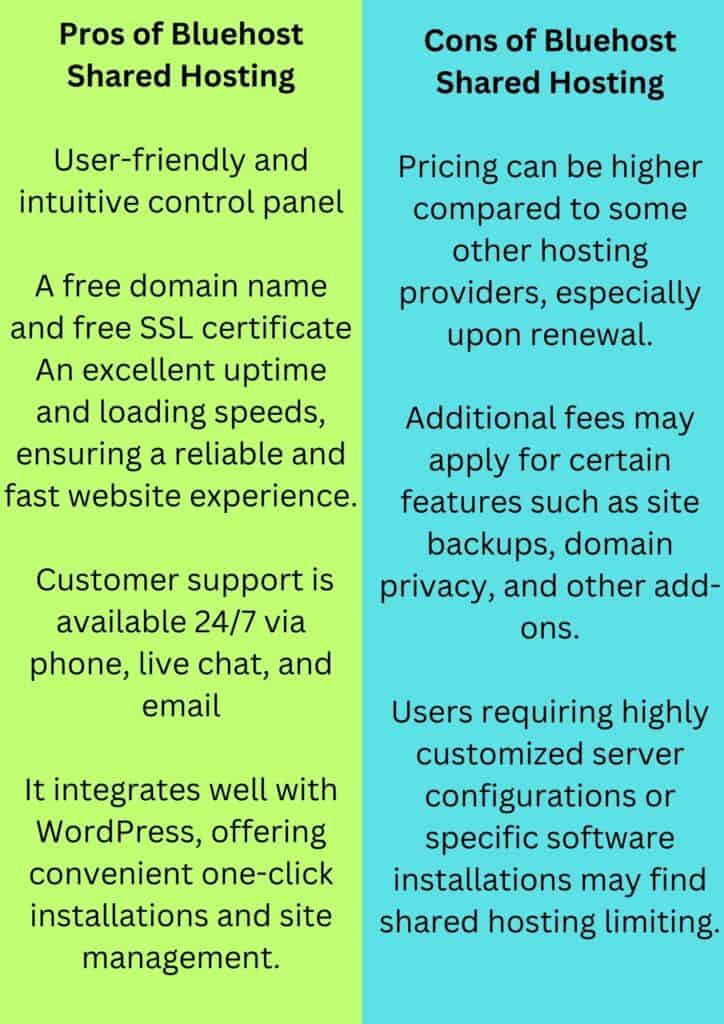
Bluehost is a reliable and versatile web hosting solution, offering a blend of performance, affordability, and user-friendly features that cater to websites of all sizes and types.
By partnering with Bluehost, you can unlock your website’s potential and embark on a seamless online journey backed by a trusted hosting provider.
Choosing Bluehost means choosing reliability, performance, and support—key pillars that uphold a successful online presence and set the stage for your digital success.
Elevate your website to new heights with Bluehost and unlock a world of possibilities in the vast landscape of the internet.
Dreamhost
Established in 1997, Dreamhost has a strong reputation as a reliable and user-friendly hosting provider.
Dreamhost offers a range of hosting options, including shared hosting, VPS hosting, dedicated servers, and managed WordPress hosting, to cater to the diverse needs of businesses, bloggers, creativity enthusiasts, and others.
When it comes to web hosting, DreamHost stands tall among its competitors. Its shared hosting plans offer an excellent balance of reliability, affordability, and a wide range of features.
So, please grab a cup of coffee and explore the pros and cons of DreamHost sharing hosting with us.

Pros and Cons of Dreamhost’s Shared Hosting Plans
Let’s see the pros and cons of Dreamhost’s shared hosting plans.
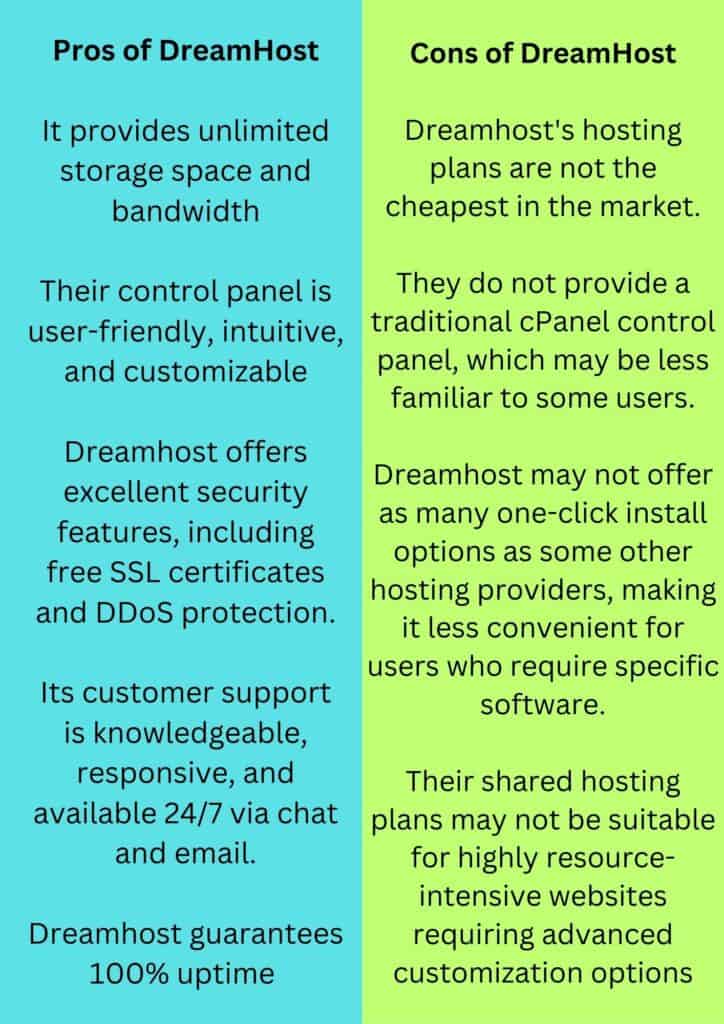
Choose Dreamhost to unleash the power of your website, unlock limitless possibilities, and embark on an online journey that stands out from the crowd.
Embrace the hosting powerhouse that is Dreamhost and set the stage for your digital success.
Hostinger
Founded in 2004, Hostinger has emerged as a dynamic and trusted web hosting provider, serving millions of users worldwide.
With a focus on delivering high-quality hosting at budget-friendly prices, Hostinger offers a wide array of hosting solutions, including shared hosting, VPS hosting, cloud hosting, and more, catering to the diverse needs of individuals and businesses.
Let’s analyze its pros and cons.

Pros and Cons of Hostinger’s Shared Hosting Plans
Let’s delve into the pros and cons of Hostinger’s shared hosting plans.
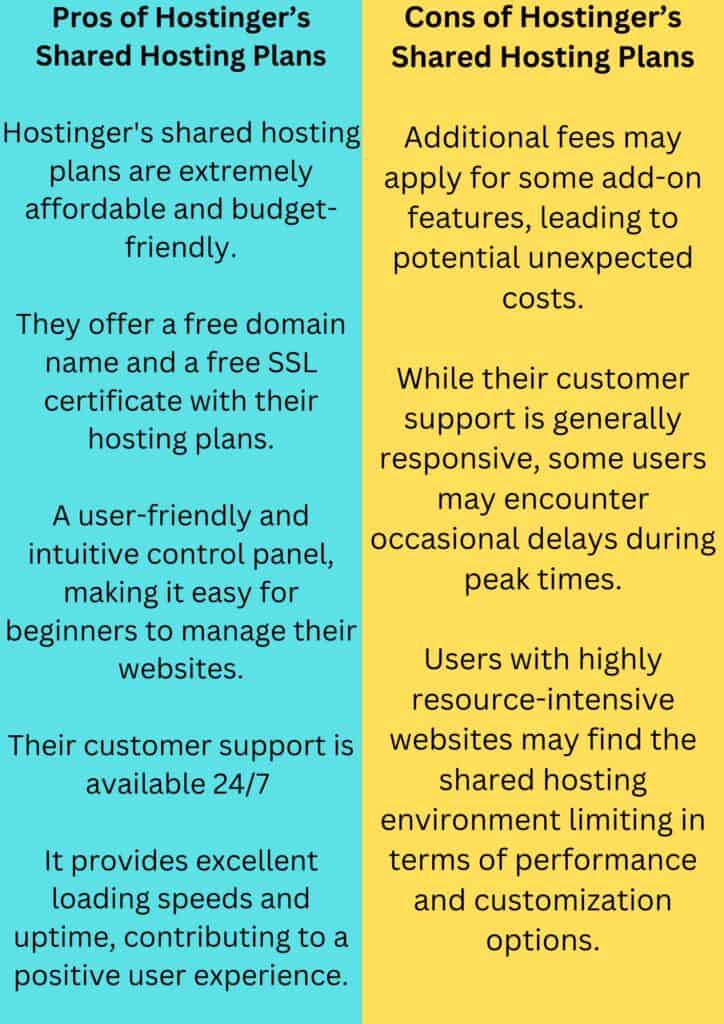
Choose Hostinger as your hosting companion and unlock the potential of your website with a reliable, high-performance, and budget-friendly hosting solution that propels your online presence to new heights.
HostGator
Since its inception in 2002, HostGator has been synonymous with reliability, affordability, and a wide range of hosting options, catering to the diverse needs of individuals, small businesses, and large enterprises.
From shared hosting to dedicated servers, HostGator’s portfolio encompasses a spectrum of hosting solutions designed to empower users with a seamless online experience.

Pros and Cons of HostGator’s Plans
Let’s delve into the world of HostGator’s plans to explore the pros and cons.
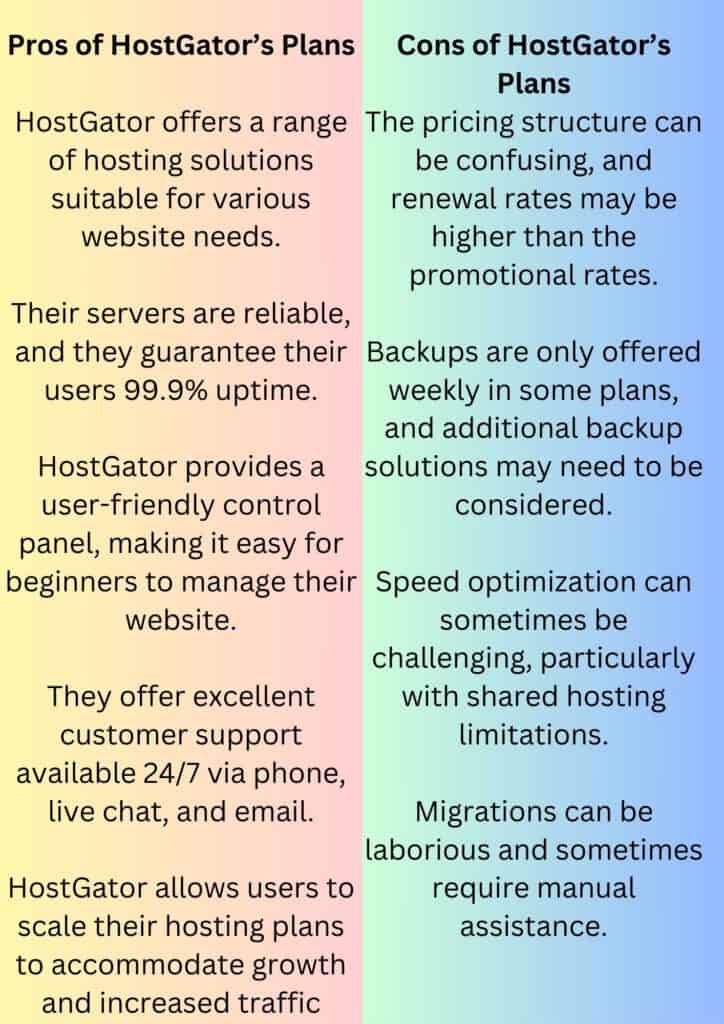
From industry-leading uptime to round-the-clock support and a steadfast commitment to empowering users with performance-driven hosting, HostGator is a faithful ally in the digital domain.
Choose HostGator as your hosting partner and embark on your digital journey with assurance powered by a hosting provider that puts your online success within reach.
SiteGround
Established in 2004, SiteGround has quickly ascended to prominence with its innovative approach to web hosting, catering to the diverse needs of individuals, small businesses, and enterprises.
SiteGround’s comprehensive portfolio encompasses a range of hosting solutions, including shared hosting, cloud hosting, dedicated servers, and more, designed to deliver high-performance hosting with an emphasis on reliability and user experience.

Pros and Cons of SiteGround’s Shared Hosting Plans
SiteGround is a popular choice and is known for its shared hosting plans. Let’s dive into the world of shared hosting with the pros and cons of SiteGround!
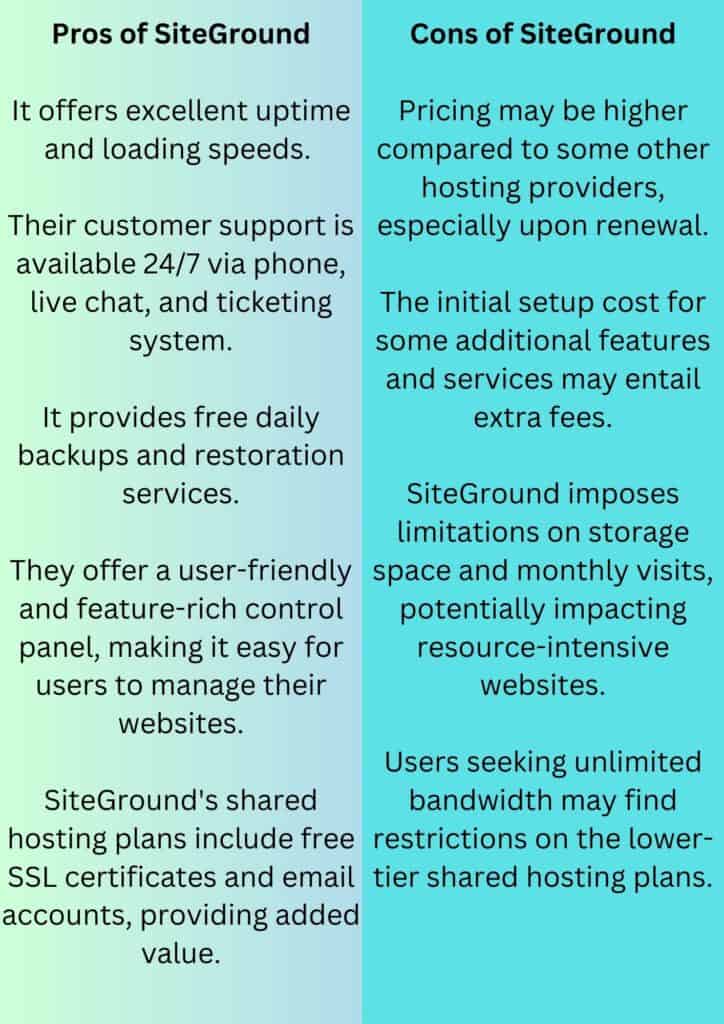
SiteGround equips you with the tools and resources needed to flourish in the digital landscape, from lightning-fast websites to proactive security and round-the-clock support.
Choose SiteGround as your hosting partner and embark on your digital journey with assurance backed by a hosting provider committed to elevating your online success.
InMotion
With its founding in 2001, InMotion Hosting has solidified its position as a vanguard in the web hosting industry, catering to the diverse needs of individuals, startups, small-to-medium businesses, and enterprises.
InMotion Hosting’s comprehensive range of hosting solutions encompasses shared hosting, VPS hosting, dedicated servers, and reseller hosting, crafted to deliver performance-driven hosting with an emphasis on reliability, scalability, and customer empowerment.
When choosing a hosting provider, weighing the pros and cons of their offerings is essential.

Pros and Cons of InMotion’s Plans
So, here are the pros and cons of InMotion’s hosting
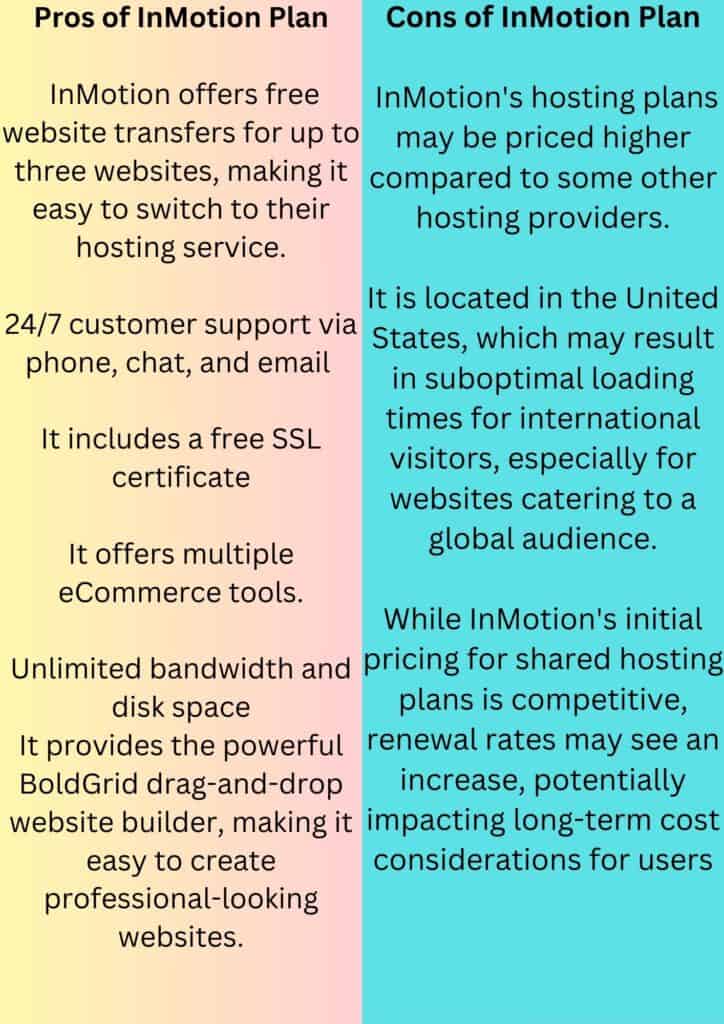
From a steadfast commitment to uptime to round-the-clock support and a meticulous focus on empowering users.
InMotion Hosting equips you with the tools and resources needed to thrive in the digital landscape.
ChemiCloud
Launched in 2016, Chemicloud is a hosting provider that offers a range of hosting solutions, including shared hosting, VPS hosting, and WordPress hosting.
Chemicloud’s hosting packages are designed for small-to-medium businesses, enterprises, and individuals, emphasizing reliability, performance, and user-friendliness.

Pros and Cons Of Chemicloud
The pros and cons of ChemiCloud’s hosting services.
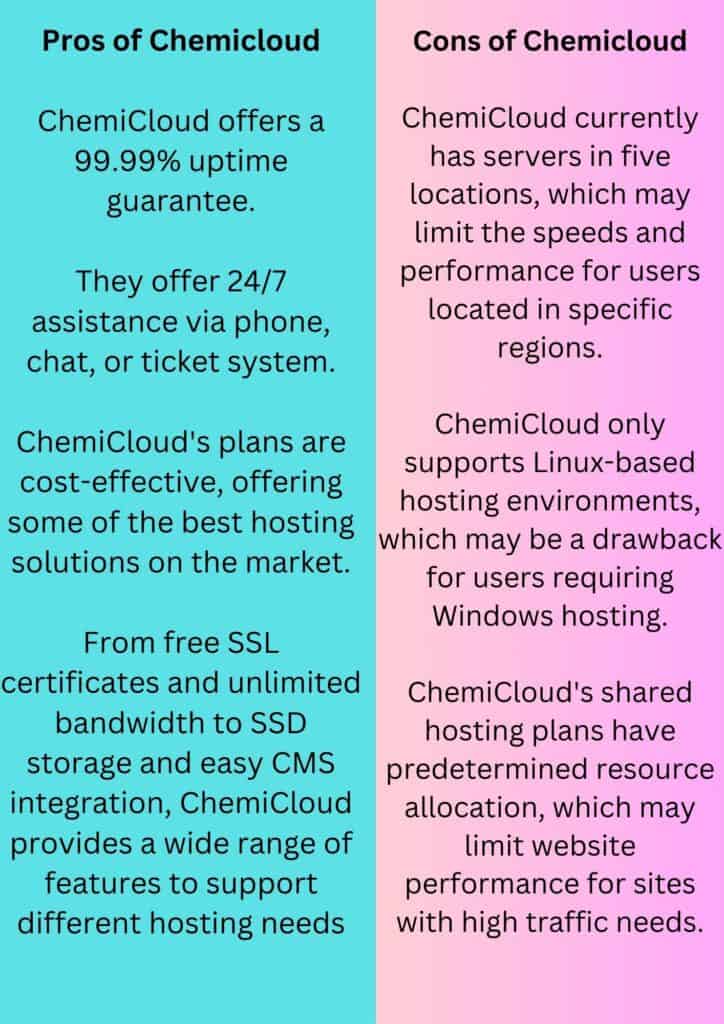
Chemicloud offers a compelling blend of performance, security, flexibility, and user-friendliness, positioning it as a hosting provider to consider for your website hosting needs.
With its range of hosting solutions, innovative technologies, and unwavering commitment to supporting users, Chemicloud is poised to drive your website’s success in the digital sphere.
Conclusion
Shared hosting is popular for individuals and small businesses looking to establish an online presence without breaking the bank.
With shared hosting, multiple websites are hosted on a single server, making it a cost-effective option.
What have we chosen?
We have chosen a hosting provider trusted by millions of bloggers worldwide. Yes, you guessed it right: Bluehost.
Its leading hosting provider has operated for over a decade, serving millions of websites worldwide with innovative hosting solutions.
Keep Smiling and Start Sharing!
FAQs on Best Shared Hosting
A. Shared hosting is well-suited for small to medium-sized websites, blogs, and portfolios, as well as for individuals and startups. It provides an affordable entry point for those initiating their online journey. However, more extensive websites with high traffic or e-commerce platforms may benefit from dedicated resources found in other hosting options.
A. Shared hosting performance can vary based on server optimization and the number of websites hosted. Reputable hosting providers maintain high-performance standards even in shared environments, ensuring sites load quickly and operate smoothly.
A. Since multiple websites share the same server, there is a slight increase in security vulnerabilities compared to dedicated hosting. However, hosting providers implement robust security measures, such as firewalls, malware detection, and regular updates, to safeguard all hosted websites.
A. Reliable shared hosting providers offer 24/7 customer support to promptly address any issues or queries. Their support teams are experienced in managing shared hosting environments. They can assist with various technical aspects, ensuring a smooth hosting experience for users.
A. Shared hosting plans often offer scalability options, allowing users to upgrade their resources as their websites grow. This flexibility makes shared hosting an attractive option for those expecting gradual expansion of their online presence.
A. The main limitation of shared hosting is sharing server resources, leading to potential performance impacts during traffic spikes on other websites sharing the server. Additionally, customization options are more limited compared to dedicated hosting environments.





